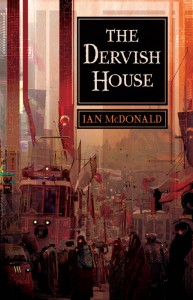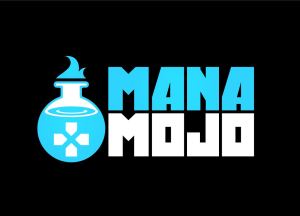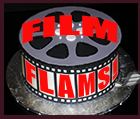 Welcome to the ninth instalment of Dust Jacket and the fourth in our month-long look at the 2011 Hugo Award nominees. This week, we’re travelling to exotic Istanbul in the near future in Ian McDonald’s The Dervish House.
Welcome to the ninth instalment of Dust Jacket and the fourth in our month-long look at the 2011 Hugo Award nominees. This week, we’re travelling to exotic Istanbul in the near future in Ian McDonald’s The Dervish House.
My co-conspirator Luke is flying solo this week, so let’s see how the world’s harshest critic goes when he’s left to run rampant on his own. Take it away Luke….
WHAT YOU NEED TO KNOW
Istanbul, Queen of Cities, wakes with a shout. Almost unnoticed, under the hustle and bustle of a mecca beginning its morning, a tram is bombed in the region of Necatibey Cadessi. For the city, it is a minor act of terrorism, not even enough to disturb the Metropolis. For six lives- Necdet, survivor of the bombing, witness to the terrorists suicide act, and now suffering mystical hallucinations; Can Durukan, a nine year old suffering from Long QT Syndrome where a sudden noise will kill him; George Ferentinou, an old Greek with a hand in one of the most terrifying stock market schemes of all time; Adnan, a young stockbroker trying to climb the corporate ladder; his girlfriend Ayse, an antiques dealer hired an ancient mystical artefact; and Leyla, who was just running late for a job interview- it is the start of week where the whole world will change.
WHAT WE THOUGHT
It’s confession time, Culturalites. I could not finish this book. I know, I know. I’m the World’s Harshest Critic™. It’s only a measly 472 pages. ‘We shouldn’t put up with this,’ you cry out like a Greek chorus, ‘Heck, he can’t even finish an award nominee.’ The ground shudders as hundreds of angry feet march away.
Anyone left? No one with torches or pitchforks? Good. Here’s why I couldn’t finish.
McDonald opens with the image of a Stork flying above Istanbul and then describes the migratory pattern of the species from Africa to the Black Sea, trying to draw a metaphor between the birds and the many wayward souls of humanity who find themselves drawn to Istanbul. It could also possibly be a metaphor for the movement of the nanotechnology being developed through the course of the book (I only read up to page 267). He then describes the particular flight pattern of this particular Stork and the difference it feels in the air quality over the city, an added strength to the uplift of warm air.
All very subtle. All poetic. All very boring. These are the pre-credit shots to a Metropolitan centric film. Sunlight filtering through the skyline as birds (storks or no) sweep majestically over a lake or river. Maybe George Gershwin’s Rhapsody in Blue whispers underneath. Okay, he’s trying to ease the audience in, establish the mood, but he wastes time and page space doing so. His opening line should not have been The white bird climbs above the city of Istanbul: a stork, riding the rising air in a spiral of black-tipped wings. Yes, it’s an easy image for the audience to picture. It’s also a static image. It’s un-compelling. Why should a reader read past that line? The book should’ve opened with Istanbul, Queen of Cities, wakes with a shout. It suggests action. Something is happening, or about to happen. It will happen suddenly and Istanbul, a grand city, is the place for events to unfold. It’s tight. It’s short. It suggests much and gives the audience a reason to read passed the first full stop. This might seem like nit picking (472 pages and I’ve only covered the first two paragraphs and opening lines) but leads to a chief problem in the book: the feeling that there’s more fat than meat.
A lack of focus is the other problem. The characters stories don’t develop so much as ramble. Take George Ferentinou, the man behind the Terror Market, an attempt to trade shares in terrorism. A fascinating, frightening concept. But much of George’s story (when he’s not encouraging Can Durukan’s investigation into the terrorist attack at the start) is taken up either with observations as to the early treatment of the Greek community or his own attempts to reconnect with a long lost love. Yes, the observations establish his history and connection to Istanbul. The storyline with the lost love is supposed to humanise George’s character and establish a connection with the audience. But there is too much reminiscence (McDonald’s excuse being he’s an old man). It feels more like backstory, and I can’t quite forgive McDonald for allotting so much page space to it. Also, the man haunted/betrayed by a lost love is an old staple of fiction (the film Casablanca springs to mind). Other genres have used this storyline effectively. This is Science Fiction, the genre of ideas, the genre that examines the human condition. Other genres would ask how it affects the way George feels. Science Fiction would ask why he feels that way in the first place.
The other characters border on mild interest to completely uncharismatic. Not all characters need to be likeable, but the best characters are interesting in spite of their personalities. Can Durukan is one of the more interesting ones. Patterns of chaos flow across Can’s heart, McDonald writes of his heart condition. His specialised ear plugs, inspired by Odysseus’ and Jason’s encounters with the Sirens, cancels out most of reality, but still allows some noise to filter in so Can isn’t completely deaf (A whisper of the world steals into Can’s ears). His only real way of connecting with the outside world (apart from school) are the occasional visits he has with George, and the nanobot Monkey he uses to patrol the roof tops of Eskikӧy. This sonic isolation (an unusual condition) piques the reader’s interest, provides a level of threat (he could conceivably die by a sudden rise in volume) and gives a reason to at least sympathise with him. But why is he likeable? He’s active, or at least wants to be. He wants to know what’s up with the terrorist act at the start. He wants to know who the nanobot spying on both ground zero and himself belongs to. The Cardio-shock again provides a barrier because he’s limited in his interactions so he has to rely on his nanobiotic familiar (which can also change into a bird and a rat) and those few he’s allowed to engage with. There’s much going on with the character.
However McDonald seems to be more fascinated by stock broker Adnan, and his attempts to conquer the corporate world and attain a lifestyle he’s only ever dreamed of but believes he deserves. He also devotes page space to Necdet, the young man caught in the tram explosion at the start, and his descent into a hallucinogenic reality (or is it reality finally making itself apparent). Neither character is likeable. Neither is interesting. Adnan’s girlfriend Ayse, an antiques dealer, at least has the Mellified Man to hunt down (although this results in being told a heap of backstory/exposition instead of actual investigation).
Because the characters are dull, the plot itself is as lifeless as a boned fish. This isn’t an action driven story. It’s not packed with incident. It’s driven by the needs of the ensemble. But the ensemble, as a group or as individuals, never does anything. Nothing happens. As such each character sections feels more like a slice of life tale than part of a gripping narrative. But even a small moment needs something going on (and it doesn’t have to extraordinary) to make the moment. All the meaning and the answers lie on the far side of page 267. But nothing happened along the way to make me turn to page 268. This novel is mundane. And I mean that in the worst possible way.
Lastly, the world itself. For me, Istanbul never really woke with a shout. There’s a bit of background to the city, as there are to all cities But what makes Istanbul Istanbul? The story could’ve been set in New York, London, even Melbourne (we are a Tram town). The exploration of other cultures is one of the defining aspects of Science Fiction, whether it’s alien worlds or variants. Where was the exploration of culture? People who have Istanbul might recognise it. For me, it could’ve been Everycity.
Also, why is this Science Fiction? It’s vaguely futuristic and there is some use of Nano technology. But it could be set in the here and now. Necdet could still suffer his mystical hallucinations. Ayse could still search for the Mellified Man. A mainstream novel might benefit from the excursion into higher layers of reality these storylines provide. SF readers made that excursion a long time ago.
The Dervish House has one interesting character that could’ve been developed further, and McDonald occasionally writes a poetic line. But really, the good stuff should not be crammed into the end. 1.5 Lukes.
IS IT HUGO WORTHY
No way, on god’s green earth, by all that is Right and Just, should this have made it near the ballot box, let alone taking home the Silver Rocket.
WHAT DO YOU THINK?
Richo here again. It looks like Luke has well and truly lived up to his title, but is he right? Is The Dervish House as bad as Luke suggests, or is he missing something profound? As always, send us your comments, criticisms and, most importantly, your votes! Help us compile the definitive list of Greatest Sci-Fi Masterpieces.
THE RANKINGS
The 2011 Hugo nominees don’t seem to be faring so well, shoring up the bottom of our list.
POSITION TITLE AUTHOR RANKING
1 Foundation series Isaac Asimov 4.5
1 The Forever War Joe Haldeman 4.5
2 The City and the Stars Arthur C. Clarke 4
3 Non-Stop Brian Aldiss 3.5
4 Player of Games Ian M. Banks 3.25
5 Cryoburn Lois McMaster Bujold 2.25
6 Blackout Connie Willis 2
7 The Dervish House Ian McDonald 1.5
8 Feed Mira Grant 0.5
BEHOLD…THE FUTURE!
With just a few days left before the announcement of this year’s Hugo winner, we have just one review to go. Join us on Friday for our review of N.K.
Jemisin’s The Hundred Thousand Kingdoms.








